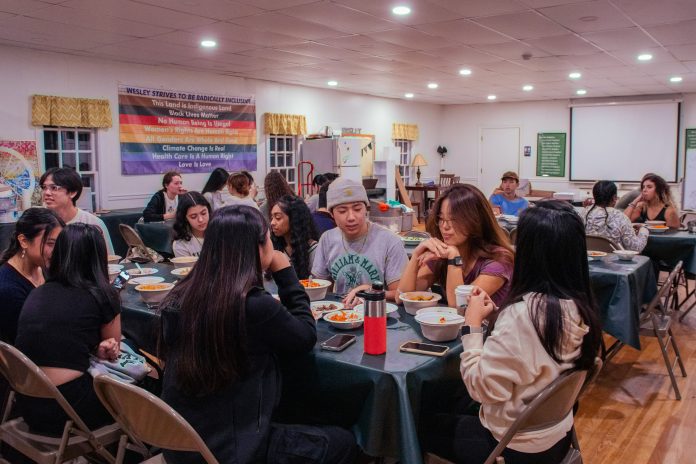The following article was previously published on The Flat Hat’s website during the week of Oct. 23. However, due to an unforeseen technological glitch, it was removed from the website for a period of time and was re-uploaded today, Nov. 6.
Tuesday, Oct. 10, the College of William and Mary’s Korean American Student Association held its second ever cooking class at the Wesley House, teaching attendees how to make the popular Korean dish bibimbap, which translates to “mixed rice” in English. Bibimbap is a flavorful Korean dish consisting of rice, mixed vegetables, sliced meat, sauce and topped with an egg.
Throughout the event, Korean culture was literally and metaphorically brought to the table as attendees assembled delicious bowls of bibimbap while learning its history and listening to popular K-pop hits. KASA members and non-members alike were scattered throughout the Wesley House while members of the executive board bustled around in preparation for the event.
“We’re trying to share Korean culture with campus,” KASA culture chair Alex Park ’24 said. “We also just want to be a positive impact on the William and Mary community, and we want to be able to do good by people. And if Korean culture happens to be the mechanism for that, I think it’s a very fun mechanism to work with.”
Park further expressed her hopes that the celebration of Korean culture would both draw people in and bring them together.
“I think at least for me personally, how a lot of other people get connected into Korean culture and Korean heritage is through food,” Park said. “There’s K-pop, and there’s Korean food. We can’t really make K-pop, but we can make bibimbap.”
With event preparation steadily underway, attendees gathered and waited to taste Korean food that otherwise isn’t readily available in traditional dining locations like the College’s dining halls.
“I first heard about this event when I was going through my email,” Tory Crenshaw ’27 said. “Then I was like, ‘Oh my gosh, they’re making food. I love food. Better than the dining hall, I’m going to go.’”
The tables began by accumulating various, pre- prepared ingredients. KASA’s executive board members laid the tables with sliced cucumbers, carrots, ground beef, steamy rice and spicy gochujang (a chili pepper paste). Chatter quieted as Park gave a brief explanation of the meaning of bibimbap and its history.
The best part of bibimbap, claimed the organizers, is how creative one could get with it. Between varieties of veggies, meats or sauces, there was no shortage of ways the dish could be made.
“I spent, I think, an hour chopping cucumbers,” Park laughed. “We want to make the experience the best we can for you guys.”
As for the history of bibimbap, references to it can be dated back centuries, as it appears in many historical documents and books. Interestingly, the theories on the origins of bibimbap vary, as some claim that bibimbap was part of a king’s meal while others state it was a fast meal for farmers as they worked the fields.
“It was nice being able to also learn about the history of it and then actually apply that and make bibimbap with other people and share that culture,” KASA member Phoebe Wu ’27 said.
Wu further expressed her joy at seeing her culture being celebrated so well, a sentiment that Park echoed.
“I see sharing Korean culture with those around me as a way of expressing love,” Park said. “My culture is something that means a lot to me, and I want to be able to share that with those around me and give people who haven’t always had the same opportunities that I had to learn about Korean culture and to learn more about people who aren’t exactly like ourselves.”
Hosting an event centered on Korean food was not only directed to those who were unfamiliar with the dish, but also to those who grew up with bibimbap and find comfort in it, Park says.
“Somebody came up to me, and she was like, ‘I really like this event because the food tasted really good, and it tasted like the Korean food I had at home, and it made me feel better,’” Park said.
Overall, Park reflected on the event with pride and says it was a success. Though the KASA executive board spent a great deal of time preparing all the ingredients and planning the event, Park says they were able to revel in their efforts by eating the meal together and knowing they did something good for their community today.
“As an executive board for an organization, we’re trying to serve our members and the people and community the best that we can.” Park said. “So it’s always very rewarding to have the positive affirmation feedback.”
Currently, KASA is working to prepare for their Chuseok showcase in November, which will feature different aspects of Korean culture, such as its folklore and spiritual tales.

